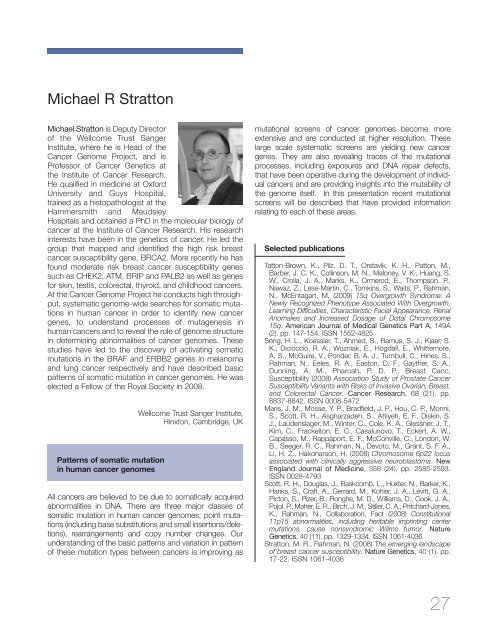PEBC Report - Programa de Epigenética y BiologÃa del Cáncer
PEBC Report - Programa de Epigenética y BiologÃa del Cáncer
PEBC Report - Programa de Epigenética y BiologÃa del Cáncer
You also want an ePaper? Increase the reach of your titles
YUMPU automatically turns print PDFs into web optimized ePapers that Google loves.
Michael R Stratton<br />
Michael Stratton is Deputy Director<br />
of the Wellcome Trust Sanger<br />
Institute, where he is Head of the<br />
Cancer Genome Project, and is<br />
Professor of Cancer Genetics at<br />
the Institute of Cancer Research.<br />
He qualified in medicine at Oxford<br />
University and Guys Hospital,<br />
trained as a histopathologist at the<br />
Hammersmith and Maudsley<br />
Hospitals and obtained a PhD in the molecular biology of<br />
cancer at the Institute of Cancer Research. His research<br />
interests have been in the genetics of cancer. He led the<br />
group that mapped and i<strong>de</strong>ntified the high risk breast<br />
cancer susceptibility gene, BRCA2. More recently he has<br />
found mo<strong>de</strong>rate risk breast cancer susceptibility genes<br />
such as CHEK2, ATM, BRIP and PALB2 as well as genes<br />
for skin, testis, colorectal, thyroid, and childhood cancers.<br />
At the Cancer Genome Project he conducts high throughput,<br />
systematic genome-wi<strong>de</strong> searches for somatic mutations<br />
in human cancer in or<strong>de</strong>r to i<strong>de</strong>ntify new cancer<br />
genes, to un<strong>de</strong>rstand processes of mutagenesis in<br />
human cancers and to reveal the role of genome structure<br />
in <strong>de</strong>termining abnormalities of cancer genomes. These<br />
studies have led to the discovery of activating somatic<br />
mutations in the BRAF and ERBB2 genes in melanoma<br />
and lung cancer respectively and have <strong>de</strong>scribed basic<br />
patterns of somatic mutation in cancer genomes. He was<br />
elected a Fellow of the Royal Society in 2008.<br />
Patterns of somatic mutation<br />
in human cancer genomes<br />
Wellcome Trust Sanger Institute,<br />
Hinxton, Cambridge, UK<br />
All cancers are believed to be due to somatically acquired<br />
abnormalities in DNA. There are three major classes of<br />
somatic mutation in human cancer genomes; point mutations<br />
(including base substitutions and small insertions/<strong>de</strong>letions),<br />
rearrangements and copy number changes. Our<br />
un<strong>de</strong>rstanding of the basic patterns and variation in pattern<br />
of these mutation types between cancers is improving as<br />
mutational screens of cancer genomes become more<br />
extensive and are conducted at higher resolution. These<br />
large scale systematic screens are yielding new cancer<br />
genes. They are also revealing traces of the mutational<br />
processes, including exposures and DNA repair <strong>de</strong>fects,<br />
that have been operative during the <strong>de</strong>velopment of individual<br />
cancers and are providing insights into the mutability of<br />
the genome itself. In this presentation recent mutational<br />
screens will be <strong>de</strong>scribed that have provi<strong>de</strong>d information<br />
relating to each of these areas.<br />
Selected publications<br />
Tatton-Brown, K., Pilz, D. T., Orstavik, K. H., Patton, M.,<br />
Barber, J. C. K., Collinson, M. N., Maloney, V. K., Huang, S.<br />
W., Crolla, J. A., Marks, K., Ormerod, E., Thompson, P.,<br />
Nawaz, Z., Lese-Martin, C., Tomkins, S., Waits, P., Rahman,<br />
N., McEntagart, M. (2009) 15q Overgrowth Syndrome: A<br />
Newly Recognized Phenotype Associated With Overgrowth,<br />
Learning Difficulties, Characteristic Facial Appearance, Renal<br />
Anomalies and Increased Dosage of Distal Chromosome<br />
15q. American Journal of Medical Genetics Part A, 149A<br />
(2). pp. 147-154. ISSN 1552-4825<br />
Song, H. L., Koessler, T., Ahmed, S., Ramus, S. J., Kjaer, S.<br />
K., Dicioccio, R. A., Wozniak, E., Hogdall, E., Whittemore,<br />
A. S., McGuire, V., Pon<strong>de</strong>r, B. A. J., Turnbull, C., Hines, S.,<br />
Rahman, N., Eeles, R. A., Easton, D. F., Gayther, S. A.,<br />
Dunning, A. M., Pharoah, P. D. P., Breast Canc,<br />
Susceptibility (2008) Association Study of Prostate Cancer<br />
Susceptibility Variants with Risks of Invasive Ovarian, Breast,<br />
and Colorectal Cancer. Cancer Research, 68 (21). pp.<br />
8837-8842. ISSN 0008-5472<br />
Maris, J. M., Mosse, Y. P., Bradfield, J. P., Hou, C. P., Monni,<br />
S., Scott, R. H., Asgharza<strong>de</strong>h, S., Attiyeh, E. F., Diskin, S.<br />
J., Lau<strong>de</strong>nslager, M., Winter, C., Cole, K. A., Glessner, J. T.,<br />
Kim, C., Frackelton, E. C., Casalunovo, T., Eckert, A. W.,<br />
Capasso, M., Rappaport, E. F., McConville, C., London, W.<br />
B., Seeger, R. C., Rahman, N., Devoto, M., Grant, S. F. A.,<br />
Li, H. Z., Hakonarson, H. (2008) Chromosome 6p22 locus<br />
associated with clinically aggressive neuroblastoma. New<br />
England Journal of Medicine, 358 (24). pp. 2585-2593.<br />
ISSN 0028-4793<br />
Scott, R. H., Douglas, J., Baskcomb, L., Huxter, N., Barker, K.,<br />
Hanks, S., Craft, A., Gerrard, M., Kohler, J. A., Levitt, G. A.,<br />
Picton, S., Pizer, B., Ronghe, M. D., Williams, D., Cook, J. A.,<br />
Pujol, P., Maher, E. R., Birch, J. M., Stiller, C. A., Pritchard-Jones,<br />
K., Rahman, N., Collaboration, Fact (2008) Constitutional<br />
11p15 abnormalities, including heritable imprinting center<br />
mutations, cause nonsyndromic Wilms tumor. Nature<br />
Genetics, 40 (11). pp. 1329-1334. ISSN 1061-4036<br />
Stratton, M. R., Rahman, N. (2008) The emerging landscape<br />
of breast cancer susceptibility. Nature Genetics, 40 (1). pp.<br />
17-22. ISSN 1061-4036<br />
27


